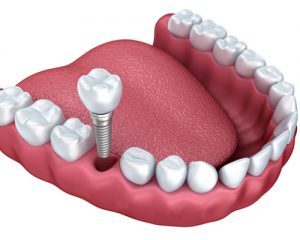
BECOMING A PATIENT
Becoming a patient of Dr. Ireland and her staff is as simple as completing an online request for an appointment or by calling our office at (678) 845-0366. Our staff will try and accommodate your request and depending on your need or suggest an alternate day where Dr. Ireland can spend as much time as possible with you, to answer any questions and address your dental needs.
Restorative Dentistry?
The term “restorative dentistry” is the integrated management of oral health problems and restoring of the mouth to a functional and esthetic state. While it is not currently recognized as a dental specialty by the American Dental Association, general dentists are able to perform many of these procedures without additional education and certification. It all depends on how difficult the procedure is and what the dental professional feels comfortable with. Many of the procedures are also covered by the dental specialty of prosthodontic dentistry, including fillings, veneers, crowns, bridges, full and partial dentures and dental implants.
Missing Teeth
Restorative dentistry is often referred to as prosthodontic dentistry. Whether your dental professional uses the term “restorative dentistry” or “prosthodontic dentistry,” the goal is to preserve natural teeth as much as possible. Replacing missing teeth with a dental implant, bridge, full or partial denture helps promote dental health as well. Filling in empty spaces in the mouth can help prevent cavities in the remaining teeth because odd-shaped gaps are vulnerable spots for plaque-causing bacteria to build up. Missing teeth also put extra stress on your remaining natural teeth because you don’t have as much surface area to chew with.
Restoration Options
When deciding on a strategy for restorative dentistry, you’ll need to consider both physical and fiscal factors—your health and your budget. Most dentists involved in restorative dentistry will try to preserve your natural teeth if possible before resorting to full or partial dentures so you won’t have to remove and clean the devices regularly. But sometimes full or partial dentures are the better option if you have many missing teeth and you’re not a good candidate for dental implants due to other health issues.
Dental Crowns & Fixed Bridges
A dental crown is a cover or “cap” that is placed over your tooth.The crown material is very strong and can be matched to the color of your smile. The dentist will place the crown over your existing tooth and restore the function and appearance of your smile. A bridge or fixed-bridge fills the gap created by one or more missing teeth. Using the same strong material of a dental crown, a bridge restores the function of your bite and the appearance of your smile. Dental bridges are usually anchored to existing teeth or implants.
Root Canal Therapy
A root canal may be needed if you have an infection, inflammation, or damage to the pulp within your tooth. Inflammation or infection can be caused by deep decay, dental procedures, or a crack or chipped tooth. Pulp damage may even be caused by an injury, even when the tooth is not visibly damaged, chipped or cracked. Left untreated, inflammation and infection can lead to an abscess or severe pain. Root canals help save the tooth and alleviates tooth pain and discomfort. During a root canal, the dentist will remove the pulp and place a protective crown over your tooth to extend its life.
Full Dentures & Partial Dentures
Dentures are removable teeth, often called “false teeth”, that replace missing teeth and restore the look of your smile. Often times, full or partial dentures are affordable options to consider when compared to dental implants but come with daily care and maintenance. Dentures can be attached with implants or held in place with adhesives. Adhesives come in many forms: creams, powders, pads, wafers, strips or liquids.
Dental Implants

Dental implants are the closest you can get to a natural smile and natural teeth. They give you a confident smile, free from work, risk or embarrassment of a shifted denture, partial denture or bridge. Dental implants give you the freedom of living a normal lifestyle.
According to the American Academy of Implant Dentistry, dental implants act as artificial tooth roots, similar in shape to screws, that become a sturdy base for supporting one or more artificial teeth, called crowns or implants. Modern dental implants have been used successfully for over 30 years. They are the strongest devices available to support replacement teeth – and even better, they allow these new teeth to feel, look and function naturally. As a experienced prosthodontist, Dr. Michelle F. Ireland can confidently place implants and crowns to restore your smile.
Dental Restoration
These days, thanks to a variety of options for dental restoration, you have many choices for repairing, worn, decayed, damaged or missing teeth and restoring a healthy and beautiful smile. Depending on the nature of your problem, your dentist will perform one of two types of dental restorations:
- Direct. Direct tooth restoration involves placing a filling into a prepared tooth cavity immediately. This procedure can be done in a single office visit. Your dentist chooses from a variety of filling options based on the type and location of the filling. For example, glass or resin ionomers are often used for replacements near the tooth root or other areas not subjected to heavy pressure from chewing.
- Indirect. Indirect tooth restoration involves customized tooth replacements in the form of crowns, onlays, or inlays. A crown covers the entire chewing surface of a tooth, an inlay lies within the cusps of the tooth, and an onlay covers and one or more cusp tip, including part of the chewing surface. An indirect tooth restoration will require more than one office visit because the inlay or onlay must be fabricated in a lab. Crowns, inlays and onlays can be made from a variety of materials. Gold is still used for some inlays, but for someone concerned about white teeth, porcelain and tooth-colored composite resins are other options.
Information gathered from OralB



